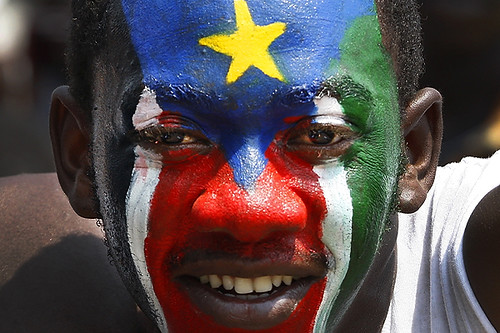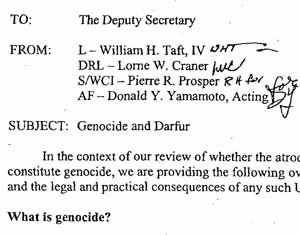Darfur
June 18, 2012 – Police fire tear gas at protesters.
Challenges for independent South Sudan; Behind the clashes in Blue Nile, South Kordofan and Darfur

South Sudan celebrates independence.
Sudanese Communist Party leader: Solutions ignored, crisis deepens in Darfur

Salih Mahmoud is close to the leadership of the armed movements in Darfur.
By Osman Shinger
May 9, 2011 -- Sudan Votes, posted at Links International Journal of Socialist Renewal with permission -- Continued armed conflict, a failure to implement UN decisions, and a lack of security despite the presence of international troops are just a few of the factors contributing to the Darfur crisis. Saleh Mahmoud, a lawyer and member of the central committee of the Communist Party of Sudan, discussed these complex issues.
* * *
Iranian and Sudanese communists on Iran protests: `A deeply genuine struggle for democracy'
Joint statement by the Sudanese Communist Party and the Tudeh Party of Iran
Recently, representatives of the central committees of the Tudeh Party of Iran and the Sudanese Communist Party exchanged views and consulted on the political situation unfolding in Iran, in light of the rigged elections of June 12 and the mass protests that quickly took place and began to gain momentum shortly thereafter. The two parties discussed the political situation in their respective countries and the conditions in which the struggle for peace, human rights, democracy and social justice is taking place. Based on their discussion and deliberations the leaderships of the two fraternal parties hereby issue the following statement:
The existing electoral process in Iran is a mockery of democracy, designed to disenfranchise the Iranian electorate. Its entire se- up is not related to the pursuit and furthering of democracy or any concept of progress within Iranian society but to keep the reins of power firmly in the hands of the despotic theocratic regime regardless of the wishes and aspirations of the Iranian people. Despite using every method to orientate the electoral process in their favour, the ruling guard of the theocracy still sought fit to directly rig the outcome of the ballots cast on the day of the election.
Sudan: ICC indictment of Omar al-Bashir -- justice or a poisoned chalice?
Let Darfurian and Sudanese voices be heard
March 9, 2009 – When the Save Darfur Coalition held a rally on April 30, 2006, drawing thousands to Washington DC, it was a watershed for Darfur activism in the US.
By Kevin Funk and Steven Fake
Few humanitarian crises have occasioned as much media and activist attention in the US as the conflict in the Darfur region of western Sudan.
* * *
Click HERE for an exclusive free excerpt from Kevin Funk and Steven Fake's latest book, Scramble for Africa.
* * *
Major politicians routinely pay homage to suffering Darfurians in their speeches, well-heeled Darfur advocacy groups take out full-page ads in the New York Times, and commentators regularly fill op-ed ledgers around the country with righteous, indignant calls for the West to act to end the suffering. Yet for all the rhetorical attention and concern afforded to Darfur in the US, what is actually understood about the US role in addressing the conflict? Further, what do we know about the historical and current nature of Washington’s relations with Sudan, and how does this relate to our understanding of the Darfur crisis, and what we can do to address it?
SUDAN: US rolls out red carpet for Darfur's executioner
Norm Dixon
Revelations of a covert rendezvous in Washington between top CIA officials and the head of Sudan’s secret police have starkly exposed just how hollow and hypocritical are the US administration’s expressions of concern for the plight of millions of Darfuri peasants, who have been systematically targeted by Sudan’s rulers in a vicious 26-month-long campaign of ethnic cleansing and mass murder.
Ken Silverstein, writing in the April 29 Los Angeles Times, reported that US government officials revealed to him that, in the previous week, “the CIA sent an executive jet ... to ferry the chief of Sudan’s intelligence agency [General Salah Abdallah Gosh] to Washington for secret meetings sealing Khartoum’s sensitive and previously veiled partnership with the administration”.
Sudanese Communist Party on ICC's request to indict Sudan President Omar Hassan al-Bashir
Statement of the Sudanese Communist Party
Khartoum, July 20, 2008 -- The inclusion of the name of the President of the Republic of the Sudan among those wanted for justice by the International Criminal Court increases the complications engulfing the crisis prevailing in the Sudan. Despite the fact that such procedures were already in place and expected since the establishment of the Court, and this last step of naming the President of the Sudan was preceded by a similar step indicting two prominent figures in the government in February 2007, the Government of the Sudan was ill-prepared both legally and politically to react to either attempts.
Sudanese Communist Party on the crisis and tragedy of Darfur
June 19, 2007 -- In the ancient history of Darfur, the existing region had been characterized by waves of migrations due to the movements of Arab and African tribes. These waves of migrations had significantly influenced the shaping of Darfur history as well as its norms, traditions and customs. Clearly, migrants had brought with them cultural, social, economic and religious currents, some of which had made radical changes in Darfur. Due to Darfur’s natural and climatic diversity, a number of tribes had settled in different parts of the area. Each tribe had its own chief assuming the management of its affairs independent of any other authority. The tribal customs were the term of reference that had governed the relations between different tribes in Darfur. Indeed, Darfur had been known to the world since the ancient history. It has been mentioned that some pharos had once visited the area, while the Romans had made attempts to subjugate Darfur in order to exploit its resources. Admittedly, the 40 Days Road linked Darfur to the Egyptian Governorate of Asute. Moreover, a number

